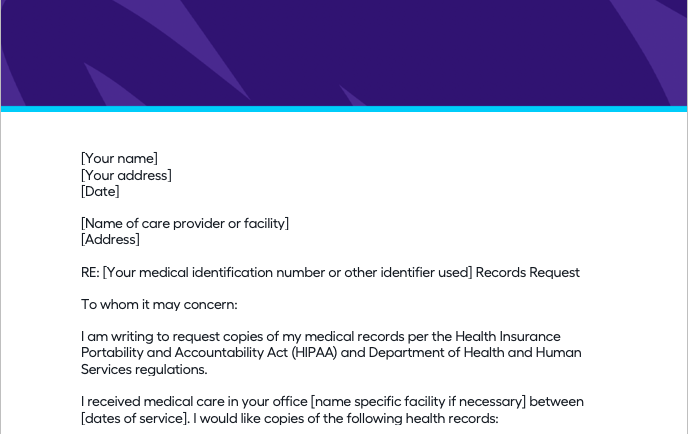Key takeaways
Medical records include a comprehensive history of appointments, diagnoses, treatments, and personal information like medication history and allergies, crucial for ongoing healthcare management.
Individuals have the right to request copies of their medical records to maintain personal health records or for specific needs such as changing healthcare providers, legal reasons, or filing claims, with access governed by HIPAA regulations.
Requests for medical records usually require written communication to healthcare providers, with the possibility of incurring nominal fees for copying and sending the records, and a standard response time under HIPAA is 30 days with a potential 30-day extension.
In certain situations, access to medical records may be denied, such as for psychotherapy notes, or if accessing the records could harm the patient, with specific procedures in place for making corrections to any errors found within the records.
When you go to a new doctor, often the first step is to fill out a set of forms detailing your medical history. That’s because what happened before your appointment is a crucial part of a care and treatment plan. Your medical records can be helpful to keep healthcare providers up to date, and to help you remember important details about your health. Here’s everything you need to know about what your medical records contain, and how to request copies.
What’s included in medical records?
Your medical records include your personal history of appointments, procedures, diagnoses, and treatment—along with your medication history, family medical history, and any relevant allergies. It also includes notes from visits, lab results, and a discharge summary for hospital stays. That X-ray when you broke your leg as a child? That’s in your medical record. Your updated list of prescriptions from last week? Also in your medical record. It covers “all documentation involved in the care of a patient, [both] clinical and demographic,” says Donna J. Rugg, practice director of data structure, coding, content, information governance at the American Health Information Management Association.
When would I need copies of my medical records?
It’s always a good idea to have copies of your medical information on hand, “to be aware of your personal health issues and treatment and maintain your own personal health record,” Rugg says. Doctor’s offices are only required to maintain your medical records for a certain amount of time. It varies by state law. Keeping your own copies ensures you won’t lose access to the information.
There are some situations where you’ll definitely need them. If you’re changing healthcare providers, bring along your health records so the new physician can see your entire medical history or review results of a particular test. If you’re starting at a new school that requires immunization records, you’ll need medical records for that. If you’re filing a disability claim or other medical claim with the government, you may need to provide a copy of your medical records. Plus, there are certain situations when you may need them for legal reasons. For example, if you’re including a power of attorney or advanced directive while estate planning. In most instances, medical records are shared directly from your provider to the new provider, school, or lawyer who needs them without requiring you to pass them from person to person.
Who has access to my medical records?
In some rare instances, particularly in the field of mental health, portions of your medical record may be withheld from your access if your doctor determines that access to your record would harm you in some way. In most instances, only you or someone else you have approved—called your personal representative—can look at your medical records or request them, according to the Health Insurance Portability and Accountability Act (HIPAA), which is part of federal law. If you care for minor children, as their parent or legal guardian, you can access their medical records. If you care for an adult who cannot make their own medical decisions, you must be their healthcare power of attorney or guardian in order to see their medical records. If someone has died, you must be authorized by the court as their executor in order to see their medical records. In other words, all family members don’t automatically have access.
Keep in mind, though, that your medical provider or your health plan provider may share your records with other insurance companies if they’re trying to approve treatment or attempting to bill you for medical services rendered. Law enforcement can also request access to your medical records in some instances, and public health agencies can request them in cases of a public health emergency.
How to get medical records online
How you can view your records varies based on your healthcare organization’s setup. The majority of patient records are electronic and may be viewed online in a patient portal. However, “patient portals do not typically include the entire records,” Rugg explains. It depends on the capabilities and technology of the office. If your patient information is not accessible online, you can request PDFs or physical copies of the record.
How to get medical records
If you can’t easily access your medical records online, or if you need them for a legal reason, you’ll likely have to request the records from your medical provider in writing . Here’s what to do:
- Determine why you need or want the records. Depending on the situation (for example, if it’s a legal requirement for any litigation), you may need to include specific information in your request. Also, determine which medical office you need records from if you’ve been to more than one.
- Draft a letter to your medical office that officially requests your records. Many medical providers have a records request form you can complete on their website. If not, download the template below to get started. You’ll want to include where you were treated; when you were treated; which records you want exactly; where the records should be sent and how; and a signature. Privacy Rights Clearinghouse, a nonprofit dedicated to privacy protection for individuals, suggests noting in your letter that you’re familiar with HIPAA regulations surrounding medical records requests.
- Send your request and wait. Under HIPAA regulations, your provider has 30 days to respond, though there is also a 30-day extension they can use if necessary.
- Be prepared to pay a small fee. HIPAA prohibits medical groups from charging patients for their records (Right of Access rules say that patients can always access their personal health information for free), but regulations also allow states to charge nominal amounts for copying the documents, preparing a special report, and mailing out the records. Costs vary per state. For example, in Illinois, there’s a base handling fee of $20 and a per-page copying fee of $.75 per page, up to 25 pages. Check with your state’s government website to find the fees you may owe.
- Wait for your records to arrive. If they’re being sent to another location (like a lawyer’s office), follow up after the allowed 30 days to see if the records were received.
Why was my request for medical records denied?
In only a few instances, you may be denied access to medical records you are legally entitled to see. Psychotherapy or mental health notes, for example, are not part of medical records. HIPAA doesn’t cover them as part of Right of Access regulations, which allow you access to your medical records on request. Your request may be denied if the practitioner feels it may cause harm to the patient.
Other situations that could result in a denial include:
- You are not a caregiver, or legally responsible, for the person whose records you have requested.
- The provider or plan considers you a threat to the person whose records you have requested, like in instances of domestic abuse or neglect.
- You have not submitted the request according to the provider’s procedure.
- You haven’t paid any associated fees to get your records. Note, though, that you cannot be denied because you haven’t paid for a medical service.
- You’ve requested records past the legal retention limit, which varies by state law.
In cases of a closed medical office
Medical offices can close for any number of reasons: Maybe the physician at a private practice retired, or the company was sold to a larger medical group and your office was a casualty of the merger. In those cases, you should be notified by the office that it’s closing down. Once you get that notice, request your medical records right away just in case.
If you never receive a notice and later discover that your old medical office is gone, it can be difficult to obtain your medical records. Regulations vary state by state for how medical records should be stored and for how long following the closure of an office. See what the rules are for your state. Nearly all states require the local health department to be notified of where the records are going and how patients can access them. Check with them first.
If that doesn’t yield results, you have a number of time-consuming and, frankly, frustrating options:
- Search for what happened to the practice online or look for old newspaper announcements at the library. Contact any new medical group they merged into.
- Search for your old physician online and contact the new office to ask about record status.
- Contact your insurance company to see if they can assist in the search.
- Call the labs that handled your testing and X-rays to see if you can get the records piecemeal.
If you still cannot access your records after exhausting all avenues, file a complaint with the Office for Civil Rights at the U.S. Department of Health and Social Services.
How to make corrections to medical records
After you receive your medical records, go through them carefully to ensure there are no mistakes. If you find some—examples could be incorrect contact information, duplicate medications, missing appointments, or the wrong doctor listed—you have a legal right to have that information fixed. According to the Office of the National Coordinator for Health Information Technology, there’s a four-step process for making changes.
- Contact the medical office to ask about their procedure for making changes. Find out how they want changes delivered (via email or mail), to where the changes should be sent, and who is going to make the changes. They may have an authorization form or request form for release of information that you need to fill out.
- If the office sent you a record release form, complete it and attach it to your records. On the records themselves, use a pen to cross out the incorrect information. Note the corrected information, and initial and date next to the line. You may also want to include a letter that describes what needs to be changed (particularly if something is omitted from the records).
- Make a copy of all the documents to have records that you requested changes.
- Send the corrections to the medical office’s preferred contact.
You may want to follow up in a couple weeks to make sure your change requests were received, and request another set of records to verify the changes were made.





